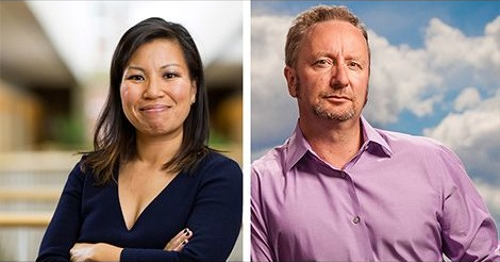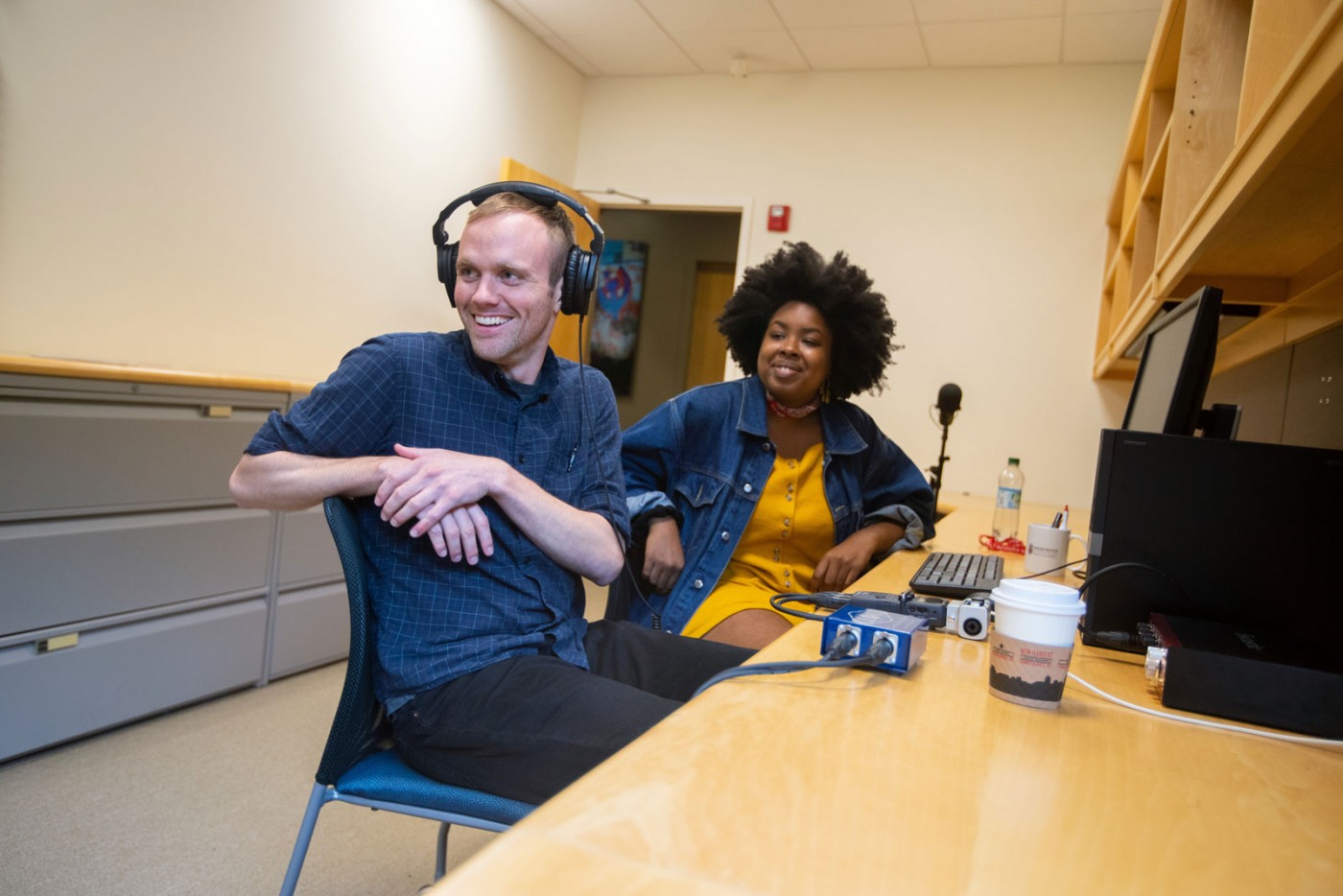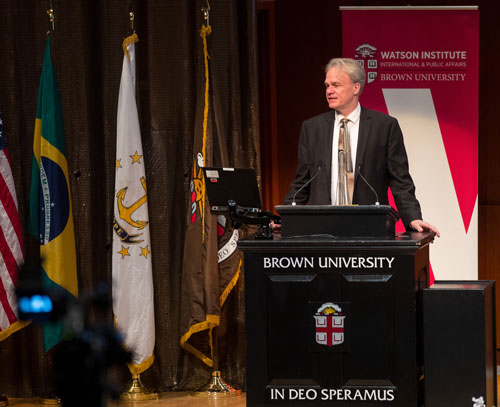PROVIDENCE, R.I. [Brown University] — As students navigated a week of move-ins, orientation events and information sessions ahead of a new academic year at Brown University, Mark Blyth and Carrie Nordlund holed up in a recording studio at the Watson Institute for International and Public Affairs to make sense of the latest Brexit news.
Britain’s prime minister, Boris Johnson, had just called for a snap election, Blyth explained, which Johnson hoped would fast-track his return to power and the United Kingdom’s departure from the European Union.
“So the [term] ‘snap election’ just means ‘fast’?” Nordlund asked, puzzled.
“‘Snap’ means ‘Avengers: Endgame,’” Blyth joked in his signature Scottish accent. “It means everybody dies in Parliament.” Then, he was back to business: “It means quick, yes.”

Twice a month during the fall and spring semesters, thousands of listeners set aside 30 minutes for “Mark and Carrie,” a smart yet accessible podcast that dives into the latest global news. The two Brown scholars who serve as hosts bring a wealth of research and teaching experience to the recording studio: Blyth is director of the Rhodes Center for International Economics and Finance at the Watson Institute; Nordlund is associate director of the Master of Public Affairs program at Watson.
For listeners, “Mark and Carrie” provides a unique opportunity to hear top experts in international and public affairs weigh in on the complexities of current events. For the hosts, who spend most of their time teaching and conducting research, it’s a practical way to share their expertise with a wide audience.
“There is a real hunger out there, beyond the academy, for understanding the worlds of economics and finance and politics and how they all link together,” Blyth said. “We can only fit 60-odd people in the Watson Institute lecture space. But with a podcast, we can — and do — reach thousands.”
“Mark and Carrie” is just one among four podcasts now recorded and produced regularly at Watson. Across the institute — and, indeed, across the entire University — a new fervor for the benefits of podcasting has taken root, with faculty, students and administrators trying their hand at sharing research, stories and ideas with the world in audio format.
From the lighthearted banter of “Mark and Carrie” to the in-depth discussion of “Trending Globally” to the thousand-foot perspective of “Faculty in Focus,” podcasts at Brown are shedding light on a broad spectrum of the groundbreaking research and original ideas emanating from College Hill — research and ideas that have the power to shape public policy, improve economic mobility and expose systemic injustice.
"We’re absolutely committed to connecting our scholarly research to a broader community of policy makers, journalists, social entrepreneurs, and everybody else who’s determined to effect positive change in the world,” said Edward Steinfeld, director of the Watson Institute. “Podcasts are proving to be a great way for us to do this. They allow us to break through so much of the noise associated with our contemporary political moment, and instead engage in thoughtful conversations and in-depth, accessible presentations of our work. To me, this is what engaged scholarship is all about.”
Policy, practice and podcasts
In the beginning, it was “Trending Globally” — launched in fall 2016 — that marked the Watson Institute’s entry into podcasting. The bi-weekly series delivers half-hour discussions on critical global challenges.
Host Sarah Baldwin, a writer at Watson, said the institute’s flagship podcast aims to elucidate how the wealth of social science research at Brown can improve everyday lives.

“Podcasting was on the rise, and we thought that would be a great, dynamic way to talk about the research at Watson and its impact on society,” Baldwin said. “Why is it important to know about chemical warfare and its consequences 20 years later, as countries still threaten to use chemical weapons? Or, what is global illiberalism and why does it matter that we understand it? We’re answering those questions to demonstrate why our research matters — why it’s not just knowledge for knowledge’s sake.”
In the last three years, the listener base for “Trending Globally” and other Watson Institute podcasts has propagated at a steady clip. Today, about 10,000 people in more than 50 countries tune in to one or more of the four shows hosted each month.
Many episodes of “Trending Globally” feature both researchers and practitioners — an ideal way to illustrate the ways in which research informs policy and triggers change. In summer 2018, for instance, Baldwin sat down with Dawn King, a senior lecturer at the Institute at Brown for Environment and Society, and Anna Lappė, a Brown alumna and sustainable food advocate, to discuss how academic research has galvanized the push for sustainable food systems. Later that year, she brought together a faculty member from Brown’s Warren Alpert Medical School, a Naval War College professor and a United Nations advisor to learn what scholars, civilians and members of the military can learn from each other about responding to humanitarian crises.
The Watson Institute has a well-documented penchant for hosting scholars and practitioners with a wide variety of experiences, political persuasions and perspectives, said Baldwin. Discussions between scholars and practitioners at Watson — once accessible only to those on College Hill and in the Providence community, and now accessible to anyone, thanks to “Trending Globally” — serve as a reminder that people with disparate views can find common ground.
“I think this podcast sometimes is a great demonstration of how people can disagree and still be civil, which we don’t see a lot at all,” said Baldwin.
The 30-minute format enables researchers to delve into the complexity and nuance of the subjects they study, which can give listeners a better understanding of global issues than they might get from a 5-minute television news segment or a 500-word article.
“Podcasts can be a little more long-form, and they can allow a bit more of an interviewee’s personality to come through,” said Dan Richards, an audio production specialist at Watson. “I love getting to learn a little bit about a person’s background and what drove them to pursue work in their field — it adds so much value and dimension.”

In addition to “Trending Globally” and “Mark and Carrie,” Richards helps to produce the “Rhodes Center Podcast,” a series of talks on international economics and finance hosted by Blyth, and “Brazil Unfiltered,” a politics and policy discussion led by James Green, director of the Brazil Initiative at Brown.
Green said he felt motivated to launch “Brazil Unfiltered” after Brazil President Jair Bolsonaro came into power. Often called the “Trump of the Tropics,” the controversial leader isn’t well understood in the U.S., Green said — and he wanted to change that.
“With the election of Bolsonaro, it became important to me to disseminate information about Brazilian politics to people in the English-speaking world,” Green said. “What’s going on in Brazil is part of a global trend where leaders are carrying out authoritarian measures under the guise of operating a democracy. I think understanding Bolsonaro is key to understanding what’s happening here at home and elsewhere in the world.”
A major hub of Portuguese and Brazilian studies, Brown is an ideal home for a podcast on contemporary Brazil, Green said. Throughout the semester, he and his guests — most of whom are fellow faculty members or activists who visit College Hill for Brazil Initiative events — address a wide variety of topics, from the ecology of the Amazon rainforest to the state of Rio de Janeiro’s favelas.
“I think the audience for this podcast is people who are open to learning more, people who want to understand how the U.S. fits into the larger global picture,” Green said. “It’s a way to become more informed about the world as you’re driving or exercising or just relaxing.”